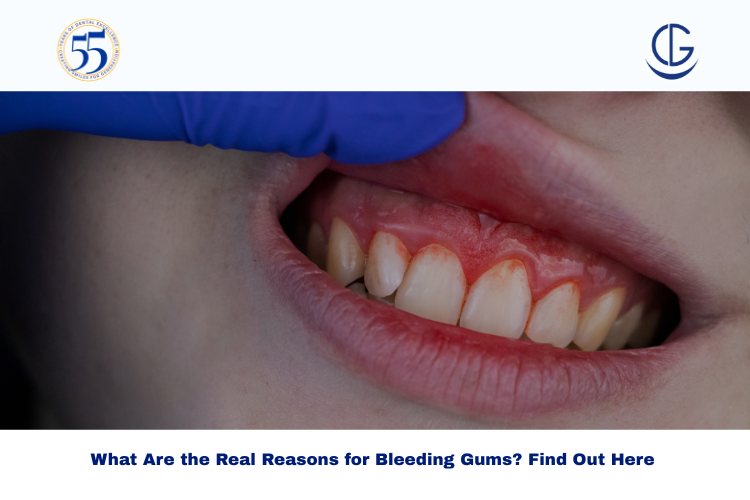Schedule Appointment



If you’ve noticed blood on your toothbrush or while flossing, you’re not alone. Bleeding gums are more common than many realize, but that doesn’t mean they should be ignored. In fact, identifying the reasons for bleeding gums early can help prevent serious dental problems down the line.
At Dr. Gowds Dental Hospital, one of Hyderabad’s most trusted names in dental care, we see countless patients with this concern—and many are surprised by the underlying causes. This article dives into the top 10 reasons your gums may be bleeding, along with helpful home remedies, prevention tips, and guidance on when to see a professional.
Neglecting brushing and flossing allows plaque to build up at the gum line. This bacteria-laden film irritates gums, leading to inflammation and bleeding. It’s the most common cause of bleeding gums.
What to Do:
Brush twice daily with a soft-bristle toothbrush and floss gently at least once a day. Use an antibacterial mouthwash to reduce plaque and bacteria.
Gingivitis is the earliest stage of gum disease. It causes red, swollen, and bleeding gums, especially while brushing.
Signs to Watch For:
Treatment Tip:
Improve oral hygiene and consider professional cleaning from a dental clinic like Dr. Gowds Dental Hospital if symptoms persist.
If gingivitis isn’t treated, it can lead to periodontitis—a more severe gum disease that can damage bone and tissue supporting your teeth.
Why It’s Serious:
Left untreated, it can lead to tooth loss.
Home Remedy Support:
While you can manage symptoms with better care, periodontitis needs professional dental treatment.
Low levels of vitamin C or vitamin K can cause bleeding gums. These vitamins are essential for healing and clotting.
Quick Fix:
Women may experience bleeding gums during pregnancy, menstruation, or menopause due to hormonal fluctuations that increase gum sensitivity.
Important Note:
This condition is temporary but requires gentle care and regular dental checkups to avoid further issues.
Using a hard-bristle brush or aggressive flossing can injure your gums, causing them to bleed.
How to Fix It:
Tobacco not only irritates the gums but also lowers immunity, making it harder for your body to fight off infection, leading to gum bleeding and delayed healing.
Best Remedy:
Quit smoking and visit a dental professional to assess damage and start recovery.
Blood thinners and some antihypertensives may increase the likelihood of bleeding gums by interfering with clotting.
What You Should Do:
If your gums start bleeding after beginning a new medication, consult both your doctor and your dentist.
Ill-fitting dentures, braces, or retainers can rub against the gums, causing injury and bleeding.
Solution:
Visit your orthodontist or dental provider for adjustments to reduce irritation.
Conditions like diabetes, leukemia, or bleeding disorders can cause gum issues. In some cases, bleeding gums are one of the early signs.
Don’t Ignore:
Persistent bleeding that doesn’t improve with oral care warrants a medical evaluation.
If your bleeding gums are mild and caused by poor oral hygiene or temporary irritation, the following home remedies may help:
Why It Works:
Salt has natural antibacterial properties that reduce inflammation.
How to Use:
Dissolve ½ tsp of salt in a glass of warm water and rinse for 30 seconds twice daily.
Why It Works:
Helps reduce bacteria and treat gum infections.
Caution:
Use a diluted solution (equal parts water and 3% hydrogen peroxide). Do not swallow.
Why It Works:
Turmeric has anti-inflammatory and antimicrobial benefits.
How to Use:
Mix turmeric powder with water or coconut oil into a paste. Apply to gums, leave for 5 minutes, and rinse.
Why It Works:
Traditionally used in Ayurveda, oil pulling with coconut or sesame oil can reduce plaque.
How to Use:
Swish 1 tablespoon of oil in your mouth for 10–15 minutes. Spit and rinse with warm water.
Why It Works:
Aloe vera soothes irritated gums and fights infection.
How to Use:
Apply fresh aloe vera gel directly to gums. Leave for a few minutes, then rinse.
Although home remedies can be helpful, normal gums do not bleed. If you have bleeding gums for more than a week, your gums are swollen, and/or if you also have pain and bad breath, then you need to seek the services of a dental professional.
We at Dr. Gowds Dental Hospital in Hyderabad provide complete gum care and periodontal treatment personalized to your oral health needs. Please do not wait for small issues to become major issues – early identification makes a difference.
Knowing the reasons for bleeding gums is the first step to effectively treating it. There are many possible causes, from inadequate oral hygiene to serious health issues. The important thing is to take action now rather than wait for long-term dental complications to arise. Home remedies involving salt rinses and turmeric paste can be used to address the bleeding gums, but it is always best to consult your dentist if symptoms persist without improvement.
The most common reason for gums to bleed when brushing is poor oral hygiene, gum disease, vitamin deficiencies, and the use of a hard toothbrush. It is essential to identify the cause early to avoid further complications.
It is possible that mild bleeding from some moderate irritation can stop with adequate oral care, but you must never ignore bleeding gums as they will often hint at gum disease or other health implications.
You can perform saltwater rinses, soothe the gums by brushing and flossing gently, and use natural remedies such as turmeric and fresh aloe vera. Remember, these are quick temporary remedies, and you should still have a dental checkup.
Yes. For example, bleeding gums can indicate something as serious as gingivitis, periodontitis, etc. They can also be an indication of potential systemic health problems like diabetes. Each situation should be verified with a dentist if symptoms persist.
Dr. Gowds Dental Hospital is a professional oral health service provider with a specialist in Periodontal treatment of all gum related problems. Their experienced team is well positioned to ensure the safe restoration of your oral health.